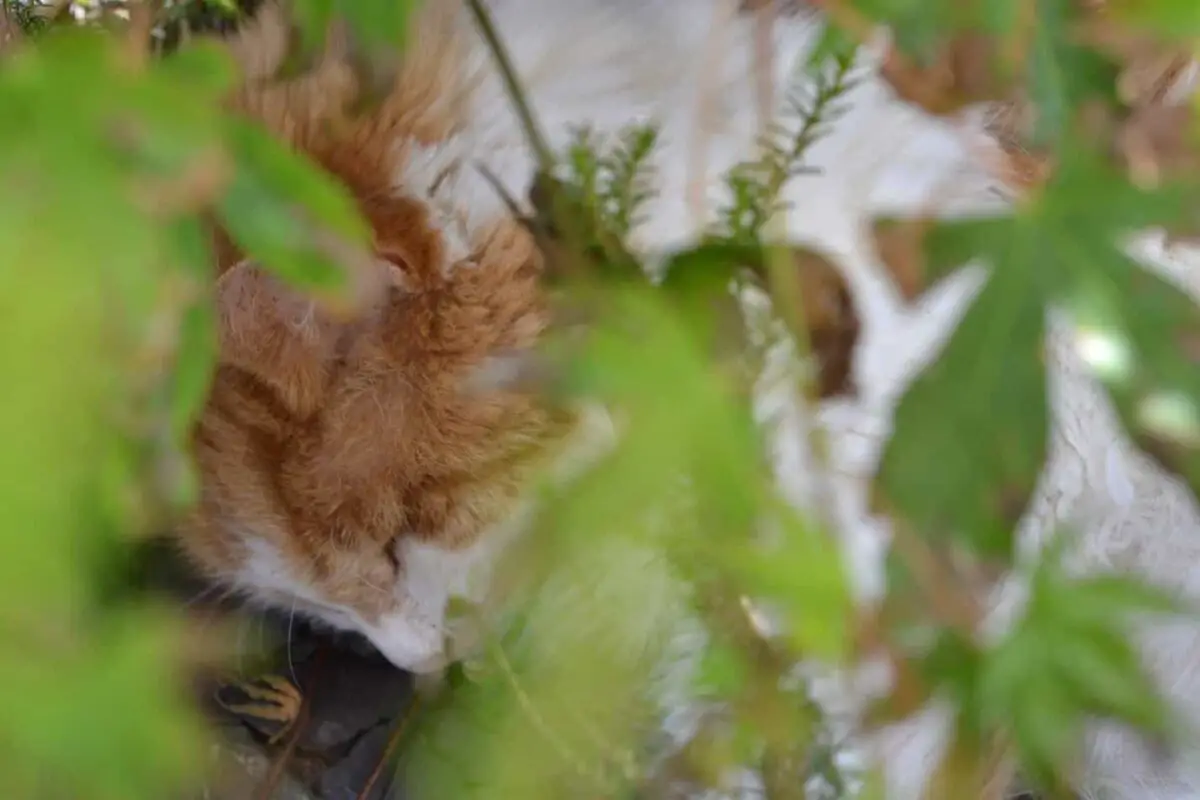Deafness in cats can be caused by various reasons, including age-related, genetics, health issues and exposure to loud noises. Deafness can develop later in life or be congenital, meaning present from birth. Understanding the condition’s causes is crucial, as the deafness might be from underlying health issues which a veterinarian will diagnose. An owner must expect to support a cat with new ways to communicate and ensure its safety in the garden.
Although there isn’t a cure for deafness, unless there is a treatable underlying cause, an owner can take steps to manage the disability to enable a cat to have a happy and healthy life. A veterinarian will offer guidance on how best to care for a feline, but rest assured, a cat will adapt to hearing loss. This article will explore simple questions about deafness, what causes the condition, and how to manage it.
What is the hearing frequency range of a cat?
Humans typically hear frequencies between 20Hz and up to 20,000Hz; a cat can hear sound up to 65,000 Hz.
Cats can hear two octaves higher than human beings. The echo chamber on either side of the skull gives the cat the advantage of being extremely sensitive to, for example, the sounds from small prey. This makes the cat the experienced hunter. About 20,000Hz is regarded as ultrasound which is probably why a cat can hear the ultrasonic sound of a garden repeller, such as the PestBye Deterrent.
Watch the Video: Pros & cons of the PestBye garden deterrent
What causes a cat to lose its hearing?

There are different reasons why a cat can lose all or part of its hearing. My cat Joey hit his head during a cat fight and days later, it caused blindness and seizures. His veterinarian did all she could but unfortunately, the injury was too severe. Tabitha had an ear infection which was treated but overall, her issue was age-related and a gradual progression to deafness.
Lifelong deafness in cats happens because the nerves linked to the ear are not responding properly and is commonly the result of –
Causes for permanent deafness:
- Age-related from a general degeneration of the inner ear
- Defective gene common in white cats
- Ear canal deformity
- Ear infections from bacterial or fungal infections
- Drug Toxicity
- Loud noises can damage hearing over time
- Hyperthyroidism
Other causes are (may be treatable):
- Heavy wax from an infection that causes a blockage in the external ear canal and impairs hearing
- Brain tumour
- Cancerous growths
- Ear damage from cat a fight
- Head trauma
A selection of signs your cat has ear problems:
- Head shaking and scratching: The reason – ear mites, especially if brown wax is visible
- Refuses to allow you to touch its ears: The reason – inflammation and pain from an ear infection
- Discharge, head titling, rubbing and scratching the ear until it bleeds: The reason – a fungal or bacterial ear infection that is inflamed
- Head tilting, loss of balance, walking in circles, eye flickering: The reason – inner ear issues
- Ears are red and swollen: The reason – sunburn
- Audible fluid sound, head shaking, ear scratching: The reason – polyp inside the ear or a tumour
- Head shaking with the ear down: The reason – catfight injury
If you have any concerns, let a veterinarian make a diagnosis to assess any severity and prescribe appropriate treatment.
Can deafness in cats be hereditary?
Inherited congenital deafness is often found in cats with white coats and can be born deaf, with hearing loss apparent in one or both ears. Oddly, white-coated cats with blue eyes is likelier to be deaf and intolerant of bright light.
As with any cat, a veterinarian will perform a visual test within the ear and look for any inflammation, heavy wax, foreign bodies and infection.
Can a cat become deaf as it ages?
Because of veterinary knowledge and medication, cats are living longer. This gives ample time for age-related deafness to develop.
Tabitha was 15 when I suspected hearing loss; months later, she developed sudden blindness from high blood pressure (hypertension).
Cats can cope with deafness and adapt to a slow deterioration of hearing loss. We already understand that other health issues can cause deafness, including a simple ear infection, which is why a clinical diagnosis is recommended. Tabitha was diagnosed with a bacterial ear infection and would have been in pain. Her vet prescribed Surolan (anti-bacterial, anti-inflammatory and anti-fungal and fights ear mites and infection) and VetsSoothe Plus Ear Cleaner (soothes, cleans and fights fungal and bacterial overgrowth, removes heavy wax). However, the infection didn’t cause her deafness and was diagnosed as age-related.
Can loud noises cause deafness in cats?
Yes, if a cat (or dog) is around loud noises regularly, like humans, high volumes can cause hearing loss or total deafness. An example would be exposure to music at high volumes, next door to an airfield, constant fireworks, and heavy machinery.
Related articles:
- TabCat cat tracker – audio and visual signals take you to your cat
- GPS Mini CAT Tracker – uses satellite and mobile connection to locate a cat
- Blindness in cats – high blood pressure (hypertension)
- Calming treatments – tried with my pets
- Hyperthyroidism in cats – coming soon
What are some signs that a cat may be deaf?
The following behaviours in a cat may indicate an ear problem. If age-related, a cat may be capable of hearing certain things listed below and not other sounds until the hearing loss is total.
How does your cat react to the following?
- Does the vacuum disturb your pet?
- Does your pet respond to their name?
- Is your pet unresponsive to any loud noises?
- Is your cat calm when a dog barks excessively?
- Has your pet’s ears stopped twitching in response to noise as it lightly naps?
- Is your pet clingy?

Sleeping more and seemingly deeply, higher-pitched vocalisation and being easily startled indicate a hearing problem. If I approached Tabitha from behind, I would wave gently to her right or left side to show her I was there. Of course, this was before her blindness.
Is there a cure for deafness in cats?
Occasionally, an underlying cause preventing sound from passing into the ear area may be treatable. A veterinarian professional will assess a cat and diagnosis it accordingly. For example, tumours can be removed, or anti-biotics and ear cleaners for infections or heavy wax.
Deafness may be treatable for:
- Ear mites
- Tumours
- Outer or middle ear infections
- Heavy wax build-up
- Polyps
Can a deaf cat lead a normal life?

Deaf cats can adjust to life with partial or total hearing loss, but there must be considerations for an owner.
A deaf cat will not hear a predator or vehicle, so advisable to cat-proof the garden or build a catio adjoining the house. Tabitha can hear about 1% of sound depending on her position versus where the noise comes from, but she cannot tell which direction. However, I call her by her name and say ‘food’ depending on my voice in location to her ear, she may hear something. I speak to Tabitha because if she can hear something, it helps her well-being.
Cats may suffer from anxiety to begin with until they adjust. Overgrooming is a stress relief for cats, so be observant of changes in behaviour.
Sign language is workable with deaf cats – my cat Albert learnt, and to get him to focus on me, I placed a finger in front of his face and drew his attention to me, then used the appropriate hand sign. You can create and repeat your signs until your cat identifies with their meaning (ie dinner).
Can deafness be prevented?
Health issues, illness, or accidents causing deafness cannot be prevented. Loud music and breeding cats with known genetic deafness can be avoided.
Related questions:
Which pet online stores are safe to buy from?
As long as an online pet store is regulated with Defra, buying regular or prescription medications is safe.
Disclaimer:
I am not a qualified veterinary professional. If you suspect your pet has any medical issues, please get in touch with your veterinary practice and follow their advice.
Poppys Pets is a participant in Awin and Amazon Associate affiliate programs which compensates me for referring traffic. It is of no extra cost to you and if thinking of buying a product, please consider using my link. It\'ll earn Poppy\'s Pets a few pennies to continue to this website. Only a selection of articles and videos on this website and YouTube channel contains affiliate links. Further information: Disclaimer and Privacy Policy
Poppy’s Pets has a column in the Withernsea & District Community News which is distributed to homes along the East Coast and inland.

